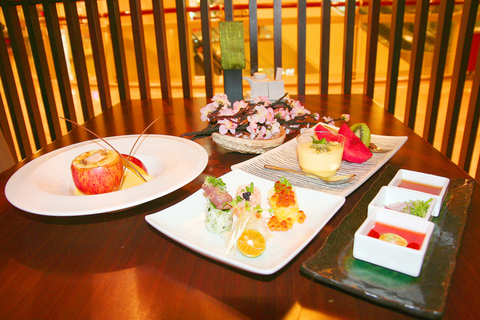Impeccably dressed in a formal suit and silk tie the manager of Wasabi, Ken Chen (陳偉德), placed a live abalone and tiger shrimp on a dish piled with steaming stones, then added sake. There was a whoosh and the air became scented with alcohol, herbs and seafood.
Other diners looked around, surprised by the sound or fragrance, and watched as Chen discreetly covered the plate with a lid that had a small hole in it, allowing a jet of steam to escape. We were told this was done so no-one had to witness the death throes of our tasty mollusk and crustacean.
It doesn't get much more natural or fresher when the catch-of-the-day is live abalone from waters near the South Pole.

PHOTO: JULES QUARTLY, TAIPEI TIMES
“Abalone is the king of seafood,” said the executive chef of Wasabi, Yankee Yang (楊正全). “These shellfish are from the least polluted seas in the world, off the Tasmanian coast by the South Pole. This live performance is a traditional and creative way of cooking. You really can taste the sea.”
The “Live Australian Abalone Set Menu” is a seven-course meal of fusion fare crafted by Yang, who learned the arts of preparing sashimi and sushi in Japan.
The meal began with abalone salad, which was served with green asparagus and bamboo shoots. The bream soup was artfully prepared as the fish was given a thin covering of flour before being steamed, so it retained its full flavor and moisture.
As may have been expected the quartet of sashimi slices — abalone, octopus, fish and shrimp — were excellent, partly because they came with wasabi made that day, grated from the root rather than recombined from powder. The sushi platter offered four taste explosions, notably the foie gras, which was outstanding.
The only dish your reviewer had reservations about was the grilled and buttered abalone in apple. The various fish elements were overpowered by a fruity, creamy, almost cheesy taste. Asian palates, we were told, are tickled by this combination but it left us unmoved.
Over 1 million Japanese visitors a year pour into Taiwan because it's relatively close, has the tallest building in the world and has many of the trappings of home: namely good shopping, hot springs and fresh fish prepared in a Japanese style.
Wasabi in the Taipei 101 Mall, therefore, is a popular destination for these tourists. So, unless you want to wait for a table and perhaps be disappointed, booking is advised.

Towering high above Taiwan’s capital city at 508 meters, Taipei 101 dominates the skyline. The earthquake-proof skyscraper of steel and glass has captured the imagination of professional rock climber Alex Honnold for more than a decade. Tomorrow morning, he will climb it in his signature free solo style — without ropes or protective equipment. And Netflix will broadcast it — live. The event’s announcement has drawn both excitement and trepidation, as well as some concerns over the ethical implications of attempting such a high-risk endeavor on live broadcast. Many have questioned Honnold’s desire to continues his free-solo climbs now that he’s a

As Taiwan’s second most populous city, Taichung looms large in the electoral map. Taiwanese political commentators describe it — along with neighboring Changhua County — as Taiwan’s “swing states” (搖擺州), which is a curious direct borrowing from American election terminology. In the early post-Martial Law era, Taichung was referred to as a “desert of democracy” because while the Democratic Progressive Party (DPP) was winning elections in the north and south, Taichung remained staunchly loyal to the Chinese Nationalist Party (KMT). That changed over time, but in both Changhua and Taichung, the DPP still suffers from a “one-term curse,” with the

Jan. 26 to Feb. 1 Nearly 90 years after it was last recorded, the Basay language was taught in a classroom for the first time in September last year. Over the following three months, students learned its sounds along with the customs and folktales of the Ketagalan people, who once spoke it across northern Taiwan. Although each Ketagalan settlement had its own language, Basay functioned as a common trade language. By the late 19th century, it had largely fallen out of daily use as speakers shifted to Hoklo (commonly known as Taiwanese), surviving only in fragments remembered by the elderly. In

William Liu (劉家君) moved to Kaohsiung from Nantou to live with his boyfriend Reg Hong (洪嘉佑). “In Nantou, people do not support gay rights at all and never even talk about it. Living here made me optimistic and made me realize how much I can express myself,” Liu tells the Taipei Times. Hong and his friend Cony Hsieh (謝昀希) are both active in several LGBT groups and organizations in Kaohsiung. They were among the people behind the city’s 16th Pride event in November last year, which gathered over 35,000 people. Along with others, they clearly see Kaohsiung as the nexus of LGBT rights.